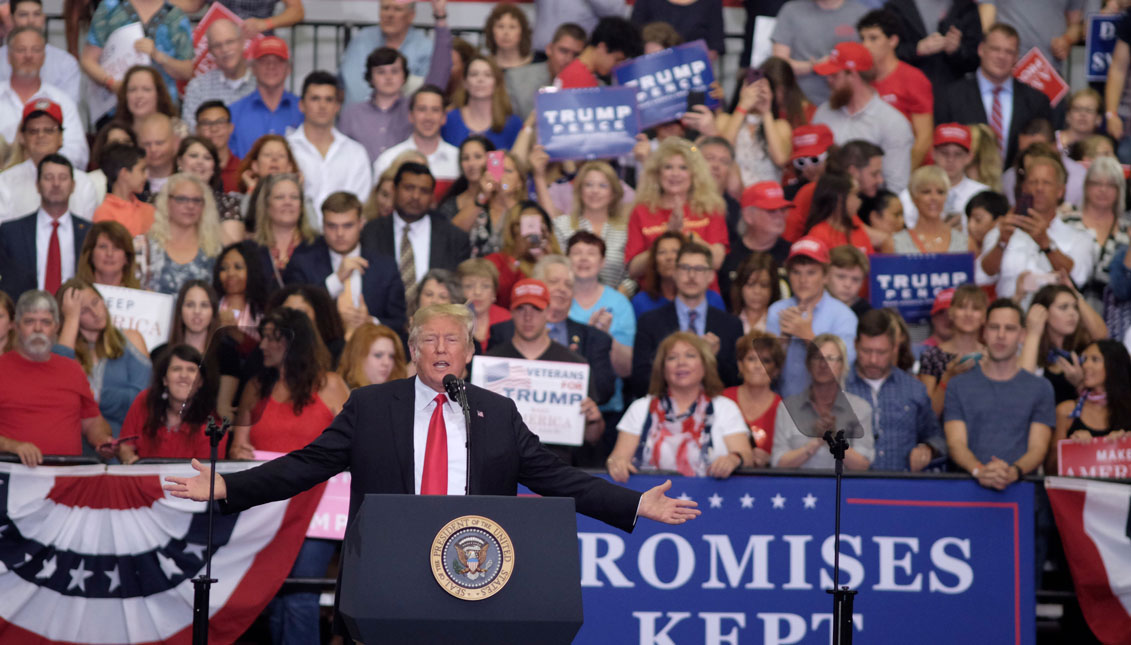
We can all hear Trump's dog whistles to racists
Last week, President Trump added to his rhetorical gymnastics with the debut of his latest hot-button term: "animals."
I've never seen a dog whistle in real life or known people who used the training tool with their pets, but I do know its purpose: to emit a sound in a range that cannot be heard by humans but is recognized by our four-legged friends. This is why the term "dog whistle" is so often used in the political sphere: a politician uses certain words as a code that can legitimately be defended to mean one thing, but is actually sending a very different message to another group.
In 2012, for example, Newt Gingrich called President Obama the "food stamp president." Gingrich undoubtedly did so to create a connection between Obama's race and the perception that black people use up a disproportionate amount of food security benefits, even though the largest percentage of Supplemental Nutrition Assistance Program participants is white.
Last week, President Trump added to his rhetorical gymnastics with the debut of his latest hot-button term: "animals."
This new Trumpism emerged during a round-table discussion on California's "sanctuary laws," which seek to protect unlawfully present immigrants from automatic referral to federal immigration officials if they're stopped by local law enforcement.
Trump's exact words were: "We have people coming into the country, or trying to come in -- we're stopping a lot of them. ... You wouldn't believe how bad these people are. These aren't people, these are animals, and we're taking them out of the country at a level and at a rate that's never happened before."
Animals.
Some complained that no one should be upset about such a remark. "Who would defend gang members? Can't we talk about the context?"
Let's be real: The context is that the guy who said this waltzed into the White House by calling Mexicans "bad hombres," "rapists" and "murderers."
Trump was, in fact, talking specifically about MS-13, the U.S.-originated gang made up of Central American refugees who came to this country in large part because of American foreign policies that helped cause major humanitarian emergencies.
RELATED CONTENT
This is your classic racial dog whistle -- say something that can be defended because it was said in a certain "context," while all the people who already see immigrants as subhuman nod their heads in recognition.
The only context that really matters in this case is that Republicans have been describing immigrants -- with little regard to their legal status -- as rats, vermin, insects and rabid raccoons for years.
After the outcry, Trump doubled- and tripled-down on the MS-13 connection. Recently the White House put out a press release titled "What You Need to Know About the Violent Animals of MS-13," which used the term "animals" 10 times in the 488-word statement.
This is on-brand for Trump, whose rhetorical flourishes have been well-documented by marketing experts and linguists as percussive, repetitive and calculated to validate the insecurities of white, working-class voters and to reinforce his biases in others' minds.
(Think: "Little Marco" (Rubio), "Crooked Hillary" (Clinton) and "The Failing New York Times." He says things over and over again until his supporters believe them as gospel.)
To recap: The idea that Trump "only" meant to call violent gang members -- who absolutely no one on the political left is defending -- animals is ridiculous on its face. There has been nothing about Trump's comments and actions that indicate any nuance in his stance against people of color who move here from other countries.
But what if Trump had meant to call only MS-13 gang members animals?
David Livingstone Smith, professor of philosophy at the University of New England and author of "Less Than Human: Why We Demean, Enslave and Exterminate Others," said this on the NPR podcast "The Takeaway":
"When you refer to a subportion of a racialized group using this sort of language, what listeners tend to do -- who are responsive to that sort of derogatory rhetoric -- is to generalize. So even if he specifically had in mind -- and for some reason didn't make clear -- that he was referring to violent members of a particular gang, the fact is that many of his listeners will almost automatically extend this to, in general, undocumented Latino immigrants and probably, actually, even documented Latino immigrants."
People, wake up to this dog whistle -- it's an effective and hate-filled part of Trump's plan to "make America great again."










LEAVE A COMMENT:
Join the discussion! Leave a comment.